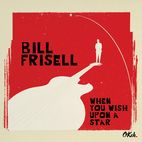Bill Frisell - When You Wish Upon a Star
Bill Frisell - When You Wish Upon a Star
OKeh / Sonymusic Veröffentlichung: 5. Februar 2016
There is an undeniably potent and mysterious connection between music and image and it is one that Bill Frisell seems inexorably drawn to. His compositions, arrangements and guitar technique have always been particularly receptive to their stimuli; the abstract paintings of Gerhard Richter, the photographs of Disfarmer, or the cartoons of Jim Woodring are good illustrations.
The potency of this symbiotic relationship is an obvious one, especially in connection with the moving image (in the best films it is almost alchemical) but the element of mystery is a more complex and rewarding facet that fascinates Frisell and has finally found expression in this sequence of music for films and tv.
This collection is more than an homage to a set of iconic scores however; although the choice of music is both inspired and carefully balanced. It is, first and foremost, a celebration of the act of making exquisite music with long-term collaborators (Frisell prefers "friends") and a deeply felt commitment to the act of refined interpretation.
The aim is to 'new mint' these compositions; to bring to them an approach that reinvigorates their efficacy and makes us hear them in a way that drives to the very core of their mystery. For Frisell this is completely concomitant with his unique working practices; start by listening to as many versions as possible and commit the lyrics to heart. Then comes immersion in the original score (harmony, phrasing and arrangement) followed by "learning the notes" and hours of practice. Finally, when "it's in the blood", as Frisell puts it, then... let go and forget; let the mysterious processes sublimate in preparation for the act of creation. Easy to describe yet only achieved by consummate artistry.
The main cornerstones of the album are four 'suites' of music that reside deep within the collective psyche; 'To Kill A Mockingbird', 'Psycho', 'Once Upon A Time In The West' and 'The Godfather'. These pieces construct a landscape into which four iconic songs from "the factory of dreams" are inserted; 'You Only Live Twice', 'The Shadow Of Your Smile', 'Moon River' and 'When You Wish Upon A Star'. As intentional choices or subconscious suggestions on Frisell's part, these are all songs whose lyrics describe the mysterious power of dreams and their transformative abilities. Another enigmatic layer of recall is added by the inclusion of music from the bedrock tv series 'Bonanza' and 'Happy Trails', the film noir classic 'The Bad and The Beautiful' and Frisell's own contribution to the oeuvre, the disturbing 'Tales From The Far Side'. The musical choices evoke a wide diaspora of mid-twentieth century cultural values and insights that are redolent of major events. Frisell's memories of 'To Kill A Mockingbird' are intrinsically linked with those of the Civil Rights movement, for instance.
The overall result is a highly evocative musical landscape that runs the gamut of emotions. There is hope expressed here, but also regret. There is joy expressed here, but also pain. There is loss expressed here, but also gain. Little wonder then that the musicians involved are a 'dream team' comprising Frisell's "Beautiful Dreamers" trio of Eyvind Kang on viola and drummer Rudy Royston augmented by the bass player Thomas Morgan and the voice of Petra Haden.
Frisell, Morgan and Haden last collaborated on the final album of the late lamented Paul Motian; 'The Windmills Of Your Mind' (another film score). Motian's love of Broadway show tunes and his obsession with musical clarity through simplification pervade this album. His spiritual presence is obvious and welcome. As Bill Frisell says, "there were ghosts in the studio".
This aesthetic of refinement and simplification; the paring away of superfluity is at the heart of the music and Petra Haden's voice is a key factor. The obvious choice vocally, she is a driving force. Her voice is clear, clean and unadorned and she has a rare capacity for invention with an almost inestimable range of harmony. Frisell uses her voice as a front line instrument, in unison with both his guitar and Kang's viola, to great effect. She brings an element of understatement and lack of bias to the lyrics that make them almost innocent of meaning; they reverberate anew and they take on integrity that banishes any jaded overfamiliarity.
Frisell is illuminating on the subject of Thomas Morgan; "Frightening!" in his precocious abilities, he says the bass player often gives the impression of "waiting for you to arrive" as though he has already worked through the given musical permutations. "He never plays a note that isn't a direct reaction to what has just been played". This is self evident throughout his performance. Seldom has a bass player sounded so 'in the moment'.
Eyvind Kang's virtuosity, his signature timbre and his mercurial responsiveness are all well known but there is an attribute present on these recordings that outweighs all of these; absolute honesty. Kang's is not so much a performance as a confession. Witness his playing on 'The Godfather' suite. There is palpable texture and 'grain' in the contact of bow on string; it is full of pain and pity and an almost reticent understanding of the tragedy about to unfold.
To tell a drummer that he blends into the background on a recording is to pay him an exemplary compliment. Rudy Royston is one of Frisell's long-standing and stalwart partners and he is an essential element on these recordings. He is also a living, breathing paradox; grounded yet ethereal, forceful yet delicate, resolute yet yielding.
Frisell relies upon him to create and modulate the structural architecture of the pieces. Consequently, the overall feeling throughout this album is one of balance, poise and sensitive distribution of interplay.
Bill Frisell's accomplishments are legion (his short but highly idiosyncratic solo on 'Tales From The Far Side' is simply mindblowing!) yet he is constantly searching, reinventing and refining his art.
He approaches this music with an open heart and mind and inspires breathtaking performances from his collaborators. Striving for musical integrity leads him to the truth and simplicity inherent in these compositions and that gives his interpretations crystal clarity and instant identity. By recreating the simplicity he has reinstated the mystery.




